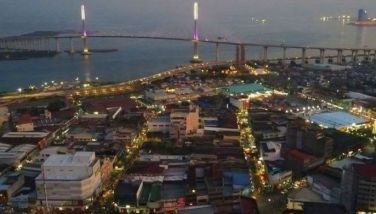The new life of Gloria Arroyo
CEBU, Philippines - “Before the presidency, I actually had a life,” former Philippine president Gloria Macapagal - Arroyo opens the first-ever media interview she grants since closing the chapter on her nine-year term as the country’s commander-in-chief nearly a year ago.
The now Pampanga second district representative is actually looking relaxed in her dark blue dress, smiling and seemingly at peace with herself and the world despite issues that have dragged her name since she left office to the days leading to this interview.
For someone, whose elusiveness and discomfort with the media during her nine-year rule always landed in the news, Mrs. Arroyo was for the most part of the interview unguarded, especially when it came to talking about the other role she has just embraced, somehow lending a softer side to the stern and stiff image projected of the once if not the still most powerful woman in the country.
Mrs. Arroyo welcomes us into her home by showing off a decades-old family portrait that of her as a young wife and mother at 22 with husband Jose Miguel and eldest son Mikey, which was taken at the family swing that still exists today on the front lawn.
Talk on family and her “non-political” life would set the light and free-flowing tone of the one-hour interview.
“Now, I’m getting a life that I did not have even then,” she begins. “I married and I lived in this house with my in-laws. My mother-in-law would cook and was very tolerant, up to my last toilet paper she provided, and then she had a terrific mayordoma who had been the yaya of my husband since he was born. She helped in my career because she took care of the house and everything. I didn’t have to be a housewife. I was a wife.”
“My mother-in-law died when I didn’t yet enter politics and my mayordoma died when I was president. So, when I left the presidency, I came back to this house without a mother-in-law and mayordoma to run it. So I entered now the life of a housewife which I never had before.”
Her staff says that Mrs. Arroyo notices everything—from flies to dust in the windows. Running the household, Mrs. Arroyo says, “is very therapeutic; whenever I’m idle that’s what I do.”
There’s another change that has also gone unnoticed—a change that, in fact, has recently generated front-page treatment. Yes, she’s slimmer because she just lost over 10 pounds. And no, she has not gone vegetarian, contrary to reports weighing on her new look and figure.
“This just came about because of exercise and diet because I don’t have socials at night and I don’t have many breakfast meetings now. It’s still the same basic 2 hours of high-intensity exercise, then I added 15 minutes for 3 days. I also eat only one full meal a day. Unless we’re socializing, my husband and I only have soup for dinner.”
Mrs. Arroyo, who turns 64 on April 5, adds: “I decided to have a new hairdo for my new life.”
What other free time her newfound life now affords is spent on indulging other personal interests—she just bought an iPad to download books, finished reading “Game Change,” a politically-themed book on the 2008 US Elections, opened a Facebook account, watches “American Idol,” and joins the carpool to send her grandchildren to school.
But her pace is still very much like her workhorse pace (which critics also acknowledged) when she was president, notes her chief-of-staff Elena Bautista-Horn, but “she’s been adjusting” to her now less punishing schedule and lean staff of six, among other things.
Would this change in workload possibly make room for a return to her first job as a teacher, whose former students included President Noynoy Aquino?
“Maybe one day! Of course, I have many things to share now, all the economic theories that I actually applied and worked!” she says.
Mrs. Arroyo’s home, which is spruced with photographs including one taken of her as daughter of former Philippine President Diosdado Macapagal with then former US President John F. Kennedy at the White House—a gift from present US President Barack Obama—is a stone’s throw away from Ateneo de Manila University. This is where she had her first job after graduating with an Economics degree from Assumption College.
She recalls now, “I chose teaching because it was a way of having a good balance between motherhood and career. The good thing about it was that for 12 hours of teaching a week and then some very flexible research time, there was plenty time to be with the children. Also, I would take off the semester after I gave birth. I read at that time that what an individual learns in his whole life he learns half of it before the age of 5. So I wanted to make sure I will be able to give them a lot of time before the age of five.”
Mrs. Arroyo tells us that her children—Mikey, Luli and Dato—were spaced. This largely influenced her present responsible parenthood policy.
“I stress spacing rather than the number of children. It’s good for the health of the mother, of the baby, and of the relationship between mother and baby, mother and other children, mother and father, and the whole family.”
“I think if I were to advice somebody, I would not tell her to stick to three children, instead have your babies two or three years apart, because then for somebody who would normally have eight babies [by giving birth every year] she would end up with two or three.”
Explaining why she doesn’t link the issue of population with development, she says: “During the last global crisis, which were the economies that not only survived but also came out very strong? These were the big population countries with a good per capita income, one of which is the Philippines. So, of course, if you have a big population but the per capita income is very poor then it is still bad or you have high per capita income but your population is very small like Singapore, you also suffer. You really need those two ingredients.
The Philippines had those two ingredients. In the last year before the economic crisis, we had the 7 percent growth rate; we had already graduated to the middle class per capita income. That’s why I don’t tie up population policy with development.”
This should clearly hint at where she stands as the battle lines are being drawn on the Reproductive Health Bill in Congress. “At least it didn’t pass under my term. It’s going to be a tough fight. We shall see.”
Mrs. Arroyo admits that her take on such is also faith-based. “I’ll tell you something, my father, when he was telling me about public service, for the public servant, the priority should be God first, then country, and family last. I used to think ‘What do you mean by God first and then country?’, then analyzing it, I came to realize that when thinking of something good for the country, there are different policies, and some are more faith-based than the others like pro-life. But fortunately also, [my parenthood policy] is grounded on reason and economic logic.”
Asked on whether the challenges of the presidency were responsible for this faith and religiosity, she says, “No, no, I’ve always been religious. I learned it from the nuns in school. Not from my family because my mother was not particularly religious.”
From her mother Eva Macaraeg, nevertheless, she inherited the sternness and know-how in languages and learned that whatever is private—like emotions—should remain private.
It was also perhaps her mother who provided her first connection to Cebu, which famously delivered her one million votes during the 2004 presidential elections. “You know, my mother said she spent the best years of her life in Cebu. She was the carnival queen of Cebu at the age of 16.”
Mrs. Arroyo also fondly recalls an acting stint in a Cebu soap when she was senator. “It was done in Carcar. I played a mother of a rape victim. They didn’t require me to cry but they required me to be sad. But the one who played my daughter was so good that I actually cried.”
While she was recruited to enter politics as early as the late ‘70s for the opposition ticket, Mrs. Arroyo says that it was only when she topped the senatorial elections in 1995 that her father, who passed away in 1997, began to think of the possibility that she might follow in his footsteps.
“I would say that among all the historical figures that I’ve come across with either personally or vicariously, my father has been the biggest influence on me. Everything about the family and private life was my mother, and everything about public service was my father. He didn’t meddle in how we were raised, and he expected my mother not to meddle also in his governance.”
“He had said that the presidency is a position not to be enjoyed but you have to work hard for the good of the people and necessarily, you have to suffer. And he suffered because he worked 20 hours a day. He had a silent heart attack when he was president, which we didn’t know until much later on.”
“I got that focus from my father, although I didn’t work for 20 hours when I was president. I did about 12 because I had to make sure I would have one-hour exercise twice a week and seven hours of sleep.”
Asked how her father would think of her now if he were still alive, she says after some pause: “For my father, he thought we were the worthiest people. He was a very, very affirming father. Our choices were his choices. Before, when I was about to do something, he would advise. But after I’ve done something, his concern was if I did the right thing.”
With that, amidst controversies that beset her presidency which prompted lowest approval ratings upon her exit, Mrs. Arroyo is standing pat on the belief that she was able to accomplish what she set out to do. “Considering that our political culture is so negative, what’s more important is that the progress that we worked for speaks for itself.”
“From day 1 that’s what I tried to do — to have permanent change in the economy of the Philippines so that it can have our growth sustainable and move into the first world within 20 years.”
“And I feel that I was able to do a lot in that direction. First of all, we had unprecedented 38 quarters of consecutive growth, [it] never, never happened before. And then I left the economy with a 7.9% growth rate, better with what I started with. And at 7.9%, what does it mean? 9M new jobs, more people with healthcare and education, there’s the RORO (Nautical Highway) which connected our nation like never before, and from almost nothing, we have become a BPO powerhouse, all the while we were paying our financial obligations. And then if you just have a look at the skyline of Manila and of Cebu — how they have changed in the last 10 years. There are more buildings, malls, small businesses...”
Asked to react on criticisms that these gains have not trickled down to the poorest of the poor, she says, “First of all, the poverty rate has gone down in my administration compared to the previous years. But of course, if you’re talking about from 49 to 23% of whatever it is, there’s still that number that are poor.”
Unwilling to offer any criticism to her most vocal of critics, she explains, “What for? I’ve never returned the negative feelings. I’m only matapang to people accountable to me. I get mad because of what they did, not the person.”
“It’s actually very liberating not to be her spokesperson anymore kasi nagpipigil talaga kami nuon,” former deputy presidential spokesperson Gary Olivar offers. Len Bautista-Horn, who is also Mrs. Arroyo’s current spokesperson, adds, “Even now, we will speak when we need to speak. We choose our battles. We choose issues we comment on. Why glorify them?”
There were times when the urge to engage is strong, but Mrs. Arroyo ruminates, “Maybe because as what St. Paul said, ‘Let God be your lawyer.’ There’s a point in time when the bully stops running after the bully in the school yard. I don’t get out of my way to reach out; on the other hand, I don’t do an aggressive act.”
Looking back, does she feel she has been underappreciated and unfairly judged? Mrs. Arroyo says, “Well, I would have wished that there was less negativism. That’s part of what I’ve been saying about how I see the Philippines. We’re not one country but we’re like two countries with the same name. There’s that one Philippines that’s the economy, which after many years of cumulative effort, we’re taking off. Then there’s the other Philippines, which is the political system, after many years of degeneration also, it’s becoming a hindrance to progress.”
“I tried to be philosophical about it,” Mrs. Arroyo sums up her experiences, including the crises, the sacrifices, and the tumult. “You know, it was a big honor to serve the Philippines, I am gratified because I was able to deliver what I wanted to do.”
Does she look forward to the day when history will cast her in a more positive light? She says, “Of course I care, but most importantly, I let God take care of the rest.”
*Special thanks to The FREEMAN opinion columnist Mr. Mike Lopez for assistance with the interview. (FREEMAN)
- Latest
- Trending




















